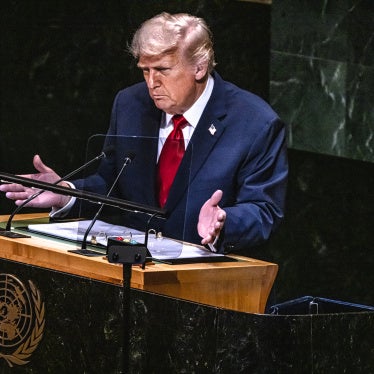(Geneva) – The US government should stand with the victims of racism and attend the upcoming United Nations meeting on racism in Geneva, Human Rights Watch said today. The concerns driving a US boycott of the meeting have been substantially addressed in the latest negotiations. US participation at the meeting from April 21-24, 2009, is essential to put to rest the tainted history of the 2001 Durban conference on racism, Human Rights Watch said.
“From the outset we have shared Washington’s deep concern about the efforts by some governments to use the racism meeting to single out Israel for criticism and to promote the idea that religions should be protected over rights, ” said Juliette de Rivero, Geneva advocacy director at Human Rights Watch. “But governments have now excised troubling language about the Middle East and ‘defamation of religion’ from the meeting’s draft resolution.”
Over the past three weeks, under Russian chairmanship, the preparatory negotiations have produced a document that provides the basis for a broad global agreement that takes stock of efforts to end racism, racial discrimination, xenophobia and related intolerance and paves the way for future UN engagement on the matter. US participation in earlier preparatory meetings played a pivotal role in shaping a more balanced and constructive document. Governments and blocs from every key region have shown a willingness to make concessions in the interest of a consensus document and a positive outcome.
In the coming days the United States will reach a final decision about whether to go through with its boycott of the meeting, which begins on April 21, 2009. Human Rights Watch urged the Obama administration to seize the opportunity of the Geneva conference to demonstrate its professed commitment to multilateralism and human rights and to make good on President Barack Obama’s pledge not to set unyielding preconditions for global engagement. This meeting would be an opportunity to signal to the international community that the flexibility and receptivity others showed toward US policy positions in the earlier negotiations will be rewarded by engagement, rather than continued aloofness, from Washington.
In addition to the formal adoption of the outcome document, the proceedings in Geneva will also include speeches by government officials. President Mahmoud Ahmadinejad of Iran is among a handful of heads of state scheduled to attend. In addition, several unofficial gatherings of non-governmental organizations will take place before the governments meet. The presence and active engagement of governments committed to human rights will be essential to ensuring that the focus of attention in Geneva remains on the substance of the pledges made by governments, Human Rights Watch said.
“The story out of Geneva next week can be that the international community has come together to put the taint of the 2001 Durban conference behind it and commit to a bona fide agenda to combat racism,” said de Rivero. “If the US fails to participate, it will disappoint many who invested hope in the Obama administration’s commitment to engage internationally to protect human rights.”





